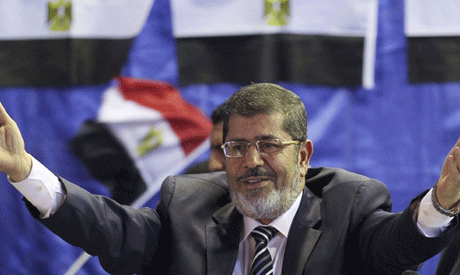 The Muslim Brotherhood, certain of an electoral victory, is getting ready to assume Egypt’s presidency for the first time in its 84-year-old history, but that might not be enough to prevent the powerful military establishment from becoming a power behind the throne.
The Muslim Brotherhood, certain of an electoral victory, is getting ready to assume Egypt’s presidency for the first time in its 84-year-old history, but that might not be enough to prevent the powerful military establishment from becoming a power behind the throne.
The powerful Islamist organisation, which proved to be Hosni Mubarak’s staunchest opponent despite being suppressed by the autocratic leader for 30 years, has declared that its candidate, Mohamed Mursi, has won the final stage of the election and will be the country’s first elected president.
Mursi, according to his own campaign's reports, has managed to beat off competition from ex-prime minister and former air force commander Ahmed Shafiq, who would have been the preferred choice for a ruling military that is keen to retain its influence, although these results are contested by Shafiq's campaign.
Now that the Brotherhood has apparently reached the pinnacle of political success, a power struggle is on the cards.
Egypt’s Supreme Council of the Armed Forces (SCAF) is so powerful that the Brotherhood courted it on several occasions to make sure it will not turn its back on the power-hungry organisation, which is seeking to wipe out the bitter memories of being repressed under Gamal Abdel-Nasser, Anwar El-Sadat and Mubarak, all of whom were army strongmen.
With both sides sharpening their knives, the looming confrontation is unpredictable.
The SCAF has made its intentions clear by issuing a highly-controversial decree that will see it regain legislative authority following the dissolution of the parliament’s lower house, which had been dominated by the Brotherhood’s Freedom and Justice Party (FJP).
The decree, which the SCAF branded as an annex to the Constitutional Declaration it issued last year, also enables the military council to choose a 100-member constituent assembly which will draw up the country’s first post-Mubarak constitution.
When the Brotherhood attempted to win over the SCAF, it abandoned revolutionaries, taking the side of the ruling military and going as far as accusing the youth activists of sowing chaos when they were involved in bloody clashes with the army and police in the last few months of 2011.
It is now the time for the Brotherhood to change course.
"We have all learnt the lesson. When we were divided, the counter-revolution almost defeated us but, thank God, the army’s latest decisions helped us reunite and tipped the balance of power," influential Brotherhood figure Mohamed El-Beltagy, who was a member of the now-dissolved parliament, said on his Facebook page.
"The revolution continues and the political path cannot triumph on its own nor can it replace the path of the revolution.
"We should never allow anything to drive a wedge between the revolution and the Brotherhood, which is responsible now for leading a political scene that is not dominated by a certain faction," he added.
Love-hate relationship
The Brotherhood played a key role in fighting Mubarak's forces during the 18-day uprising, which eventually toppled him and gave the organisation a new lease of life.
They were specifically lauded for their role in keeping pro-regime thugs at bay during the infamous February 2011 'Battle of Camel', when horse and camel riders stormed Tahrir Square in an attempt to push out the steadfast demonstrators.
Mubarak’s departure on 11 February last year sparked wild celebrations among all protesters in the iconic square, but a divisive transitional period took its toll on the Brotherhood and demonstrators alike, giving the SCAF room to tarnish the revolution’s image among ordinary people, according to analysts.
The Brotherhood has also distanced itself from many subsequent demonstrations, fearing that its participation might deny the group a much-needed place in the power hierarchy.
It incurred the wrath of protesters in the process, becoming a new foe for the youths who struggled to retain their influence after failing to set up a political party or contest many seats in the parliament.
"In the beginning, the Brotherhood sought consensus and worked with other political factions, but all of that changed following the parliamentary elections," Wahid Abdel-Maguid, a former MP who was part of the FJP’s electoral coalition, said in a television interview.
"Once they dominated the parliament, they began to turn their backs on everyone and tried to work on their own, and that made life much easier for the SCAF to do whatever it wants."
Apparently realising that fact, the Brotherhood attempted to garner revolutionary support in the build-up to the crucial presidential runoff vote, which pitted Mursi against Shafiq, branded by protesters as 'feloul', an Arabic term used to describe the remnants of Mubarak’s regime.
Many of the revolutionaries opted to boycott the vote, but Mursi still managed to slip through, according to his campaign's tallies of the vote.
However, with more dark clouds on the horizon, the Brotherhood cannot afford to rest on its laurels nor work on its own. Revolutionary support remains pivotal.
"The coming president will not be able to do anything alone. He needs the support of everyone to get ready for the new challenges," Abdel-Maguid added.



